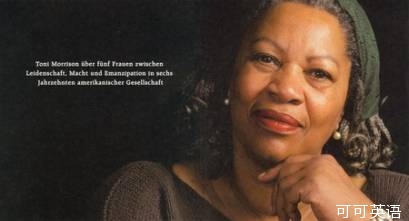(单词翻译:单击)
名著阅读
Little rice, little bean,No meat in between.
Hard work ain't easy,Dry bread ain't greasy.
He was up now and singing as he mended things he had broken the day before. Some old pieces ofsong he'd learned on the prison farm or in the War afterward. Nothing like what they sang at SweetHome, where yearning fashioned every note.
The songs he knew from Georgia were flat-headed nails for pounding and pounding and pounding.
Lay my bead on the railroad line,Train come along, pacify my mind.
If I had my weight in lime,I'd whip my captain till he went stone blind.
five-cent nickel, Ten-cent dime,Busting rocks is busting time.
But they didn't fit, these songs. They were too loud, had too much power for the little house choreshe was engaged in — resetting table legs; glazing.
He couldn't go back to "Storm upon the Waters" that they sang under the trees of Sweet Home, sohe contented himself with mmmmmmmmm, throwing in a line if one occurred to him, and whatoccurred over and over was "Bare feet and chamomile sap,/ Took off my shoes; took off my hat."It was tempting to change the words (Gimme back my shoes; gimme back my hat), because hedidn't believe he could live with a woman — any woman — for over two out of three months. Thatwas about as long as he could abide one place. After Delaware and before that Alfred, Georgia,where he slept underground and crawled into sunlight for the sole purpose of breaking rock,walking off when he got ready was the only way he could convince himself that he would nolonger have to sleep, pee, eat or swing a sledge hammer in chains. But this was not a normalwoman in a normal house. As soon as he had stepped through the red light he knew that, comparedto 124, the rest of the world was bald. After Alfred he had shut down a generous portion of hishead, operating on the part that helped him walk, eat, sleep, sing. If he could do those things —with a little work and a little sex thrown in — he asked for no more, for more required him todwell on Halle's face and Sixo laughing. To recall trembling in a box built into the ground.Grateful for the daylight spent doing mule work in a quarry because he did not tremble when hehad a hammer in his hands. The box had done what Sweet Home had not, what working like an assand living like a dog had not: drove him crazy so he would not lose his mind.
By the time he got to Ohio, then to Cincinnati, then to Halle Suggs' mother's house, he thought hehad seen and felt it all. Even now as he put back the window frame he had smashed, he could notaccount for the pleasure in his surprise at seeing Halle's wife alive, barefoot with uncovered hair— walking around the corner of the house with her shoes and stockings in her hands. The closedportion of his head opened like a greased lock.
"I was thinking of looking for work around here. What you think?"
一点米,一点豆,就是不给肉。
干重活,累断腿,面包没油水。
现在他起床了,一边修理前一天打坏的东西,一边唱着歌。他在监狱农场和后来战争期间学的那几首老歌。根本不像他们在“甜蜜之家”唱的,在“甜蜜之家”,热望铸成了每一个音符。
他从佐治亚学来的歌是平头钉子,教人敲呀敲的只管敲。
我的头枕在铁道上,火车来碾平我的思想。
我要是变成石灰人,肯定抽瞎我的队长。
五分钱钢镚,一毛钱银角,砸石头就是砸时光。
但是太不合时宜了,这些歌。对于他正在从事的那点家务活———重安桌子腿、装修玻璃窗———来说,它们太响亮、太有劲了。
他已唱不出过去在“甜蜜之家”树下唱的《水上暴风雨》了,所以他满足于“呣,呣,呣”,想起一句就加进去一句,那一遍又一遍出现的总是:“光着脚丫,春黄菊,脱我的鞋,脱我的帽。”改词很吸引人(还我的鞋,还我的帽),因为他不相信自己能和一个女人———任何女人———在一起住太久,三个月里不能超过两个月。离开特拉华之后,他在一个地方大概只能逗留这么长时间。再以前是佐治亚的阿尔弗雷德,在那里,他睡在地下,只在砸石头时才爬到阳光里。只有准备好随时走掉,才能使他相信,他不必再带着锁链睡觉、拉屎、吃饭和抡大锤了。然而这不是一个寻常房子里的寻常女人。他刚一走过红光就知道,比起124号,世界上其他地方都不过是童山秃岭。逃离阿尔弗雷德后,他封闭了相当一部分头脑,只使用帮他走路、吃饭、睡觉和唱歌的那部分。只要能做这几件事———再加进一点工作和一点性交———他就别无所求,否则他就会耽溺于黑尔的面孔和西克索的大笑。就会忆起在地下囚笼里的颤抖。即使在采石场的阳光下当牛做马他也不胜感激,因为一旦手握大锤他就不再哆嗦了。那牢笼起了“甜蜜之家”都没起到的作用,起了驴一般劳动、狗一般生活都没起到的作用:把他逼疯,使他不至于自己疯掉。
后来他去了俄亥俄,去了辛辛那提,直到站在黑尔·萨格斯的母亲的房子前,他仍然觉得没有什么事情自己没见过、没感受过。然而,甚至现在,当他重新安装被自己砸坏的窗框时,他也还是说不清见到黑尔的妻子时那种由衷的惊喜———她还活着,没戴头巾,赤着脚、手拿鞋袜从房子的拐角处走来。他头脑的关闭部分像上了油的锁一样打开了。
“我想在附近找个差事。你说呢?”
背景阅读

本书简介:
《宠儿》是托妮·莫里森最震撼人心、最成熟的代表作,现已经成为当代文学史上不朽的经典,也是美国文学史上最畅销的作品之一。小说完成于1987年,1988年即获得美国普利策小说奖。2006年《纽约时报》召集125位知名作家、评论家、编辑及文坛泰斗等选出自己心目中“25年来最佳美国小说”,《宠儿》得票最高,名列第一。
“你的爱太浓了!”——一个不可能重复的故事!!!
女黑奴塞丝怀着身孕只身从肯塔基的奴隶庄园逃到俄亥俄,奴隶主循踪追至;为了使儿女不再重复自己做奴隶的悲惨命运,她毅然杀死了自己刚刚会爬的幼女宠儿……十八年后宠儿还魂重返人间,和塞丝、塞丝的女儿丹芙以及塞丝的情人保罗•D生活在同一幢房子里。她不但加倍地向母亲索取着爱,甚至纠缠和引诱保罗•D,不择手段地扰乱和摧毁母亲刚刚回暖的生活……全书充满苦涩的诗意和紧张的悬念。
作者简介:
托妮·莫里森,美国当代最重要的女作家之一。1931年生于美国俄亥俄州,曾担任兰登书屋编辑、资深编辑,1989年起任普林斯顿大学教授。主要代表作有《最蓝的眼睛》、《秀拉》、《所罗门之歌》、《宠儿》、《爵士乐》、《天堂》等,曾获美国普利策小说奖、美国图书评论协会奖等多项大奖。1993年获诺贝尔文学奖,是历史上得此殊荣的唯一黑人女作家。


